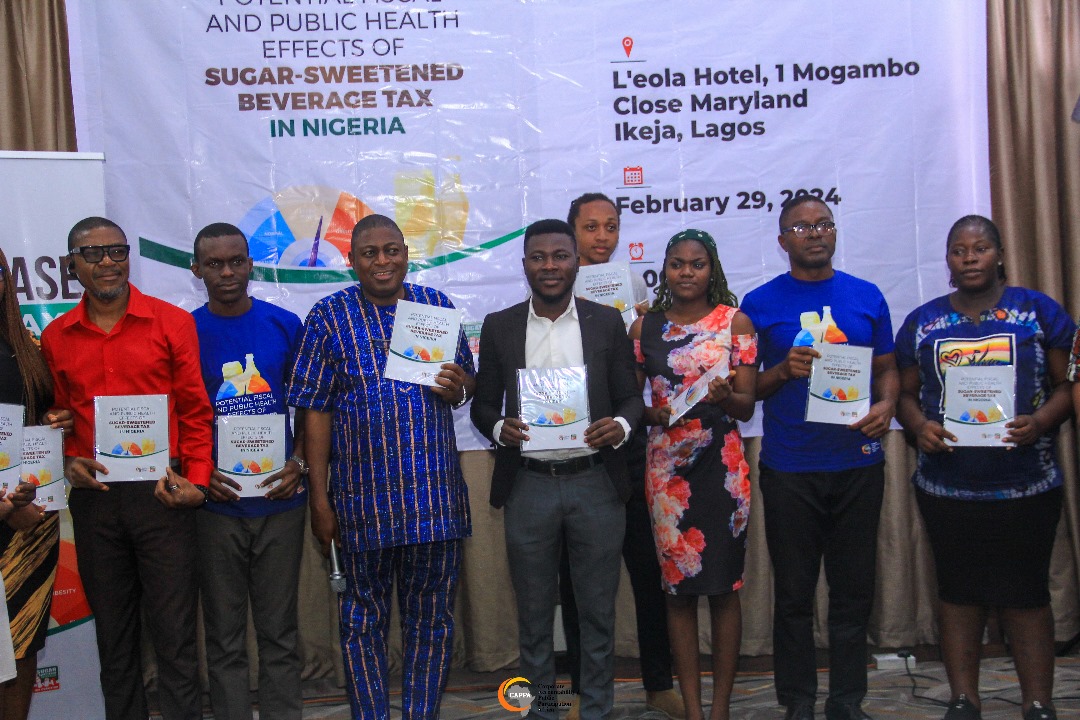Saving Lives, Reducing Non-Communicable Diseases Through Increase Of SSBs Tax In Nigeria
..Over 184,000 Deaths Linked To SSBs Intake Worldwide Yearly

Executive Director of Corporate Accountability and Public Participation Africa (CAPPA), Akinbode Oluwafemi (third left); Research Associate, Centre for the Study of Economies of Africa (CSEA), Fidelis Obaniyi (middle) and others at the unveiling of Potential Fiscal and Public Health Effects of Sugar-Sweetened Beverage Tax in Nigeria report in Lagos
By Edu Abade
For the umpteenth time, public health advocates and environmental activists have canvassed an increase of Sugar-Sweetened Beverages (SSBs) tax to save lives and reduce the burden of Non-Communicable Diseases (NCDs) linked to overconsumption of soft (carbonated) drinks laced with large doses of sugar.
Speaking at the unveiling of a report titled: Potential Fiscal and Public Health Effects of Sugar-Sweetened Beverage Tax in Nigeria on Thursday, February 29, 2024 in Lagos, they insisted that the current tax of N10 per litre remains grossly inadequate to discourage Nigerians from over-consuming soft drinks and therefore, reduce the health burden on the country.
Lamenting that Nigeria is the fourth largest consumer of SSBs globally, they, therefore, proposed an increase of the tax to a minimum of N130 per litre, maintaining that the amount will ensure that manufacturers of SSBs would shift the burden to the consumers, which will effectively check overconsumption through an increase in their retail prices
Speaking, Executive Director, Corporate Accountability and Public Participation Africa (CAPPA), Akinbode Oluwafemi, stressed that the issue remains that of public health and the real economic cost of overconsumption of SSBs in Nigeria.
“When Nigeria introduced the N10 per litre Excise Duty on SSBs in 2021 through the Finance Act, it was celebrated as a win for public health but as concerned advocates with history in the long battle against the menace of tobacco and the tobacco industry, it was important for us to take a critical look at the tax and its structure.
“Since we began this campaign, we have emphasized the need for a multi-sectoral, interdisciplinary and multi-prong approach that combines policy engagement with public awareness, community mobilisation and stakeholder consultation and engagements.
“We also prioritise intergenerational engagement to build consensus for an effective tax structure that will help us in the fight against the scourge of non-communicable diseases (NCDs) in Nigeria. This campaign ideology is based on the need for evidence-based campaigning towards evidence propelled decision by policymakers,” he stated.
Unveiling of the report with support from the Global Health Advocacy Incubator (GHAI) and the National Sugar Sweetened Beverages Tax Coalition (NSSBTC), Oluwafemi bemoaned the fact that increase in NCD cases in Nigeria tallies with increase in consumption of SSBs, alcohol, tobacco, trans-fat, unhealthy consumption of salt and other non-nutritive and injurious diets to the body.
He also argued that given the current socio-economic struggles of the average Nigerian in an economy that is witnessing many shocks at the same time, the burden of diseases continues to impoverish the people as many spend majority of their earnings on unhealthy diet, which leads to increased health costs, which further impoverishes the people.
“It is a cycle that needs to break. In a country where over 80 percent of the population pay for healthcare out-of-pocket, we must find a policy pathway that will effectively remove obstacles to good health and national productivity like modifiable risk factors of consumption related diseases and other NCDs.
“An effective SSB tax regime will not only reduce consumption, but also raise revenue accruable to the government,” Going by the current inflation rate, the 10Naira per litre imposed on SSBs in 2021 is today worth less than 4kobo because it was a fixed tax, not adjustable to inflation. I
“In essence, the SSB tax needs to be increased significantly in the 2024 Fiscal Act, with a framework that is adjustable to inflation as we also begin the conversation about earmarking the tax or a sizeable portion of it for public health.
“Findings of the study conducted by the Centre for the Study of Economics of Africa (CSEA) have shown that at a minimum of N130 per litre, there will be significant drop in consumption and decrease in Nigeria’s consumption-fueled diseases,” he said.
In his presentation, a Research Associate at CSEA, Fidelis Obaniyi, who cited a 2022 report of the World Health Organisation (WHO), pointed out that regular consumption of sugar-sweetened drinks is linked to increase in obesity and weight gain, type 2 diabetes, dental cavity decay, stroke, heart disease and different types of cancer.
He said globally, approximately 184,000 deaths are linked to the consumption of sugar-sweetened beverages (SSBs) every year, adding that
the Federal Government and policymakers should consider increasing SSBs tax from N10 to at least N130 to ensure substantial decline in SSBs consumption, as well as invest in targeted health promotion campaigns to educate Nigerians about the adverse health effects of excessive intake of SSBs.
In her presentation titled: NCDs as Public Health Emergences in Nigeria, CAPPA Project Officer for SSBs, Opeyemi Ibitoye, said in 2016, NCDs were estimated to account for between 24 percent and 29 percent of deaths in Nigeria, while cardiovascular diseases accounted for 11 percent (over 7 percent) of deaths attributable to NCDs.
Expanding further on the health burden of SSBs, she said cancers account for 3 percent, diabetes (2 percent), chronic respiratory diseases (1 percent, while the probability of dying prematurely from NCDs in Nigeria is over 20 percent, according to WHO data.
“The Disability-Adjusted Life Year (DALY)-number of years lost due to ill-health, disability, or early death to NCDs increased by over 20 percent from 24,987.4 in 2010 to 30,306.5 in 2019. During the same period, the DALY loss to infectious diseases decreased by roughly 6.5 percent. If the trend continues, the DALYs lost to NCDs will soon surpass those of infectious diseases,” she stated.
On the economic burden of SSBs, she pointed out that the median out-of-pocket cost of NCDs was between N10,193 and N10,750 monthly and that the estimations showed that about 30 percent of households with NCDs experienced catastrophic health expenditures in 2018.
Also, the average monthly COI of NCDs was higher among patients in private (N15,750.38) than in public HF (N13,283.37), indirect cost was higher in public HF (private N1,561.07 and public N3,739.26), while Nigeria’s National Health Accounts showed that N384.4 billion was spent on NCDs in 2017.
On his part, Food and Policy Manager of CAPPA, Abayomi Sarumi, who anchored the programme, explained that the NSSBTC is a forum that comprises over 50 members, including public health experts, policy experts, community-based groups, civil society organisations, traditional and religious institutions and health advocates across the country.
He stressed the need for stronger collaborations and partnerships to strengthen the coalition, pressure the Federal Government and policymakers to raise SSBs tax to N130 per litre and push for other policies that would improve public health in Nigeria.











